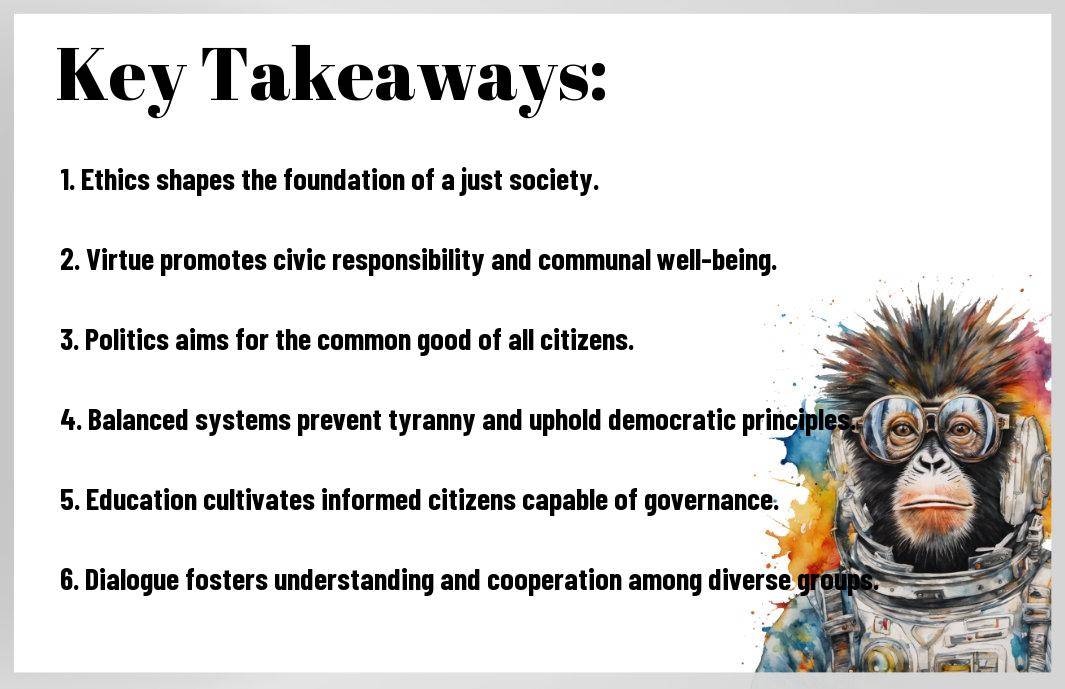
Newsletter Subscribe
Enter your email address below and subscribe to our newsletter

Enter your email address below and subscribe to our newsletter

Most of us know Aristotle as an ancient philosopher, but his ideas are surprisingly relevant to our current social and political landscape. As I explore into his thoughts, I find valuable insights that can guide you in understanding the complexities of our society today. His perspectives on ethics, governance, and civic engagement can inspire us to reflect on our values and responsibilities as citizens. Join me as I explore what Aristotle can teach us about creating a better world through thoughtful discourse and action.

For Aristotle, society was more than just a collective of individuals; it was an intricate tapestry woven from the threads of human relationships and interactions. He believed that the essence of a good society hinged on the individuals within it, as they contribute to the moral and ethical framework that holds the community together. According to Aristotle, each person has a purpose or telos that they should fulfill, and this personal development is vital for the well-being of the entire society. So, as I reflect on this, I realize that understanding your own role in the social fabric can dramatically influence not only your life but also the lives of those around you.
Around Aristotle’s thinking, the idea of the individual is deeply interconnected with the community. He emphasized that individuals are inherently social beings, and their fullest potential is only realized when they engage with others. Your moral virtues, actions, and decisions shape the environment in which you live, highlighting the shared responsibility each individual has towards fostering a harmonious society. This understanding encourages me to consider how my daily choices ripple through my community.
Between personal fulfillment and societal well-being, Aristotle placed significant emphasis on the role of the community as the nucleus of a functional society. He articulated that a strong community nurtures individuals, providing them with the support needed to realize their ideals. This interdependence creates a framework where people can thrive together, and the quality of life for everyone can improve. In my own experience, I’ve seen how active participation in my community not only enhances my personal growth but also enriches the lives of those around me.
A thriving community also fosters a sense of belonging and shared values, which helps guide collective decision-making and promotes cooperation. When I engage with my neighbors and fellow citizens, I feel a sense of responsibility not just for my own success but for the success of everyone around me. This idea that our individual pursuits are deeply tied to the health of our community influences how I view engagement in social issues, volunteerism, and local initiatives. By nurturing these relationships and working towards the common good, we create a stronger, more resilient society for all.
Clearly, Aristotle’s notion of virtue is vital to understanding how individuals and society interact within the political landscape. He posited that virtue is not just an isolated quality but a behavioral disposition that enables individuals to act in ways that foster the common good. In his view, the cultivation of virtue in citizens is vital for creating a well-functioning political community. By practicing virtue, individuals can contribute to the overall flourishing of society, making it harmonious and just.
What I find fascinating about Aristotle’s definition of virtue is that it goes beyond mere ethics; it is intrinsically tied to action and purpose. Virtue, in Aristotle’s eyes, is a mean between extremes, where an individual finds a balanced approach to life. This balance is not only about personal ethics but also about social responsibility. By living virtuously, you can achieve not only personal excellence but also fulfill your role within society in a meaningful way.
Before we dive deeper, it’s important to recognize that the concept of the virtuous citizen in Aristotle’s philosophy is someone who embodies moral character and actively engages in civic duties. This individual understands their role within the larger community and strives to contribute positively to it. By embodying virtues such as courage, temperance, and justice, a virtuous citizen inspires others to act similarly, creating a ripple effect throughout the society.
Citizens play a pivotal role in maintaining a virtuous polis, as their actions collectively shape the moral fabric of the community. I believe that when you commit to being a virtuous citizen, you’re not only enhancing your personal growth but also encouraging others to reflect on their responsibilities towards society. Through acts of kindness, promoting justice, and engaging in civic engagement, you contribute to a political environment that values virtues, ultimately leading to a more balanced and flourishing society.

Unlike many other philosophers, Aristotle had a comprehensive view of what an ideal government should be. He believed that the best political system would not be just one type of government, but rather a blend of several models that could adapt to the needs of society. His insight into the nature of governance provides a compelling framework for understanding modern politics and how we might shape ideal systems today. In particular, he identified three main types of governments—monarchy, aristocracy, and democracy—and pointed out their potential pitfalls when they devolve into their corrupt forms: tyranny, oligarchy, and mob rule.
Behind Aristotle’s analysis of government, he placed emphasis on the purpose and function of each system. The following table illustrates the three ideal forms of government and their corrupt counterparts:
| Ideal Form | Corrupt Form |
|---|---|
| Monarchy | Tyranny |
| Aristocracy | Oligarchy |
| Democracy | Mob Rule |
Any examination of these forms reminds me of the importance of balance and accountability in our governance, as well as the need for public engagement in decision-making processes.
Power, according to Aristotle, should be distributed in a way that prevents any one group from gaining too much control. He advocated for a mixed government that incorporates elements from different regimes to create stability and promote the welfare of all citizens. I find this notion particularly relevant today, as we often see the chaos that emerges when power is concentrated in the hands of a few. A balanced government tends to be more resilient and adaptable, which is imperative for thriving societies.
Consequently, by examining Aristotle’s perspective on the balance of power, we can glean valuable insights into ensuring that all voices are heard within our political systems. Through checks and balances, I believe we can foster a sense of trust and cooperation among different branches of government. It’s about promoting collaboration rather than competition, which ultimately leads to healthier and more effective governance. This idea inspires me to advocate for systems that not only challenge the status quo but also empower citizens to engage in meaningful dialogue about their collective future.

Many of us often perceive ethics and politics as distinct realms, but Aristotle’s perspective offers a refreshing viewpoint that emphasizes their interconnectedness. By integrating moral philosophy with political theory, he encourages us to see that our ethical principles inform the governing structures we create. I find it fascinating to think of governance as an extension of our collective moral values; political decisions should resonate with the ethical standards that we, as a society, uphold. This approach allows us to understand that by fostering a just society, we are also nurturing ethical citizens.
Above all, Aristotle believed that the purpose of politics is to enable individuals to live virtuous lives. In his view, the state should promote the common good, ensuring that all citizens have the opportunity to achieve their highest potential. If I consider this idea, it becomes clear that a government’s legitimacy stems from its ability to facilitate moral development within its populace. The more aligned our political institutions are with ethical considerations, the more likely we are to create a harmonious society where individuals thrive.
Beside the philosophical implications, Aristotle’s unified approach to ethics and politics has practical consequences that can shape our daily lives. When we hold our leaders accountable for their actions and demand that they uphold ethical standards, we actively contribute to a culture that values both moral integrity and effective governance. If I engage with my community and encourage discussions on ethical leadership, we can collectively influence the policies that impact our lives. This way, each of us has the power to advocate for a society that resonates with our shared values.
Indeed, the impact on society extends beyond just political systems; it touches our relationships, communities, and even our own personal lives. When ethics are involved in political discourse and decision-making, citizens become more engaged and informed, fostering a sense of responsibility towards one another. I can’t help but appreciate how a society steeped in ethical considerations shapes our interactions and ideals, promoting a culture of mutual respect and cooperation. By embracing this perspective, we can become active participants in creating a political landscape that truly reflects our moral aspirations.
Now, as we navigate the complexities of modern society and politics, the wisdom of Aristotle can still offer guidance. His teachings on virtue, ethics, and the purpose of the state resonate strongly in today’s world where we seek to understand our responsibilities as citizens and the importance of civic engagement. Aristotle believed that a well-functioning society is one where individuals actively participate and contribute to the common good. This perspective invites us to reflect on our roles and the impact of our choices within our communities and nations.
Below, I’d like to share some key lessons from Aristotle that feel especially relevant today. First, his concept of virtue ethics encourages us to cultivate personal character and moral integrity. In a society where it often feels like success is defined solely by wealth or power, Aristotle reminds us that true happiness stems from leading a virtuous life. This focus on character can inspire you to think about how your actions can not only fulfill your personal aspirations but also contribute positively to the society around you.
Across various branches of political thought, Aristotle’s influence can be seen in discussions around democracy, governance, and the role of citizens. His observations about the importance of a balanced government and the value of middle-class participation remain relevant as we debate the nature of political representation today. Many contemporary theorists still turn to his ideas when grappling with questions related to justice, equity, and the purpose of law in civil society.
Understanding Aristotle’s insights can provide you with a framework to analyze today’s political frameworks and social structures. His emphasis on the importance of education and the cultivation of good citizenship can guide modern policymakers in shaping a society that fosters active participation, equity, and collective well-being. By recognizing how these ancient ideas find application in our current context, we can draw meaningful connections and develop thoughtful approaches to address contemporary challenges.
Before I dive deeper into Aristotle’s insights, I want to emphasize the importance of dialogue in understanding his philosophy. Aristotle believed that genuine discourse is key to discovering truth and fostering good citizenship. I find it powerful to engage in conversations that challenge our perspectives and encourage us to think critically. When I discuss ideas from Aristotle, I’m reminded of how his method of inquiry, rooted in questioning and dialogue, can lead to deeper insights about our society and politics. I encourage you to foster discussions in your own circles, as these exchanges can pave the way for a richer understanding of our civic responsibilities and the values that unite us.
With a focus on practical implications, Aristotle’s teachings can offer us valuable tools to navigate contemporary societal challenges. His emphasis on the importance of virtue and ethics in public life resonates today, especially when we witness the often polarized political landscape. I think about how we can embody these virtues ourselves, not just in our political opinions, but in our everyday interactions. You and I can cultivate an ethical approach to civic engagement by prioritizing the common good and seeking collaboration over conflict. By doing so, we can contribute to a healthier, more vibrant democratic process.
Practical applications of Aristotle’s ideas extend to our everyday lives as well. For instance, you might consider the concept of the golden mean, which advocates finding balance in your actions and decisions. This idea can be particularly helpful when managing personal relationships or navigating workplace dynamics. By striving for moderation, we can develop more constructive ways to engage with others, ensuring our voices contribute to a harmonious society. Ultimately, by integrating Aristotle’s wisdom into our lives, we can cultivate a space where dialogue and ethical action flourish, enriching our personal and collective experiences.
Summing up, I believe that delving into Aristotelian thought offers us valuable insights into society and politics. His emphasis on virtue, the importance of community, and the role of ethical governance can profoundly influence how we understand our own political structures. You may find that applying his principles to your daily life can guide your engagement with important social issues and encourage you to think critically about the systems in place around you.
By embracing the wisdom of Politics (Aristotle), we can strive for a more balanced and just society. I encourage you to explore these ideas further, as they might spark a deeper understanding of your role within your community and the political landscape. Engaging with Aristotle’s teachings can inspire us to be more active participants in our democracy and help foster a society that nurtures both individual potential and collective well-being.
A: Aristotle’s political philosophy is grounded in the idea of the “good life” and the role of virtue in achieving it. He believed that the purpose of the state is to promote the good life for its citizens. Key principles include the importance of virtue in both individuals and rulers, the concept of the common good, and the idea that different forms of government can contribute to a stable society, such as monarchy, aristocracy, and polity, while cautioning against their corrupt forms: tyranny, oligarchy, and democracy.
A: According to Aristotle, citizens play a pivotal role in the political community as active participants in governance. He emphasized the idea that true citizenship involves engaging in political life, which includes debating policies and participating in decision-making. This involvement helps to shape the moral and ethical character of the society, suggesting that a healthy political community relies on informed and virtuous citizens.
A: The ‘Golden Mean’ refers to Aristotle’s ethical principle that virtue lies between extremes of excess and deficiency. In the political context, this means that a balanced government or political system reflects moderation and avoids extremes. For example, a just government maintains a balance between the needs of the individual and the needs of the community, promoting social harmony and stability.
A: Aristotle viewed justice as a fundamental virtue that goes beyond mere legality. He differentiated between distributive justice (fair allocation of resources) and corrective justice (fair resolution of disputes). For him, laws should aim at promoting the common good and fostering virtue among citizens. Therefore, effective governance involves not just enforcing laws but creating conditions where justice and fairness can flourish within society.
A: Aristotle’s classification of political systems can still be applied to understand modern democracies. His idea that democracies can devolve into mob rule underlines the importance of balancing majority rule with protections for minority rights. He also stressed the importance of a middle class as stabilizing elements within democracy, suggesting that a society with a robust middle class is less prone to extreme factionalism and provides a bulwark against tyranny.
A: Aristotle posited that education plays a vital role in shaping virtuous citizens and effective leaders. He believed that a well-rounded education fosters critical thinking, ethical reasoning, and civic responsibility. In contemporary society, this underscores the necessity of investing in quality education both for individual development and for the health of democratic institutions, asserting that an educated populace is necessary for informed participation in political processes.
A: Aristotle maintained that ethics and politics are intrinsically connected, as the goal of both is to achieve the good life. He argued that political institutions should reflect moral values and foster the cultivation of virtue among citizens. This intersection emphasizes that ethical leadership is vital for effective governance, and political decisions should prioritize moral considerations alongside practical outcomes, ensuring that policies reflect the shared values of society.